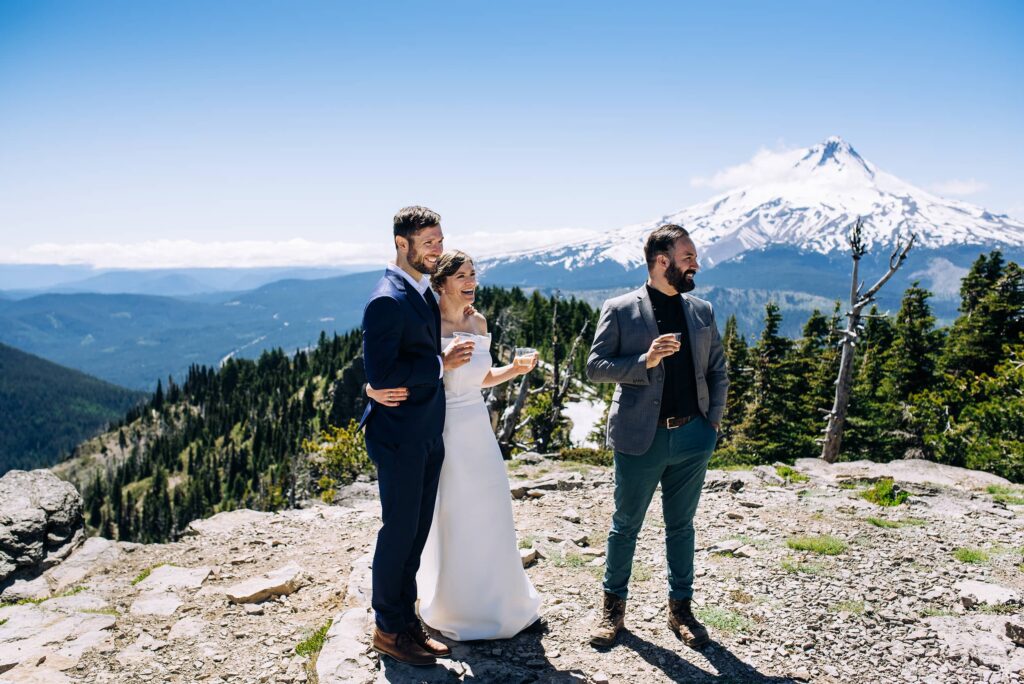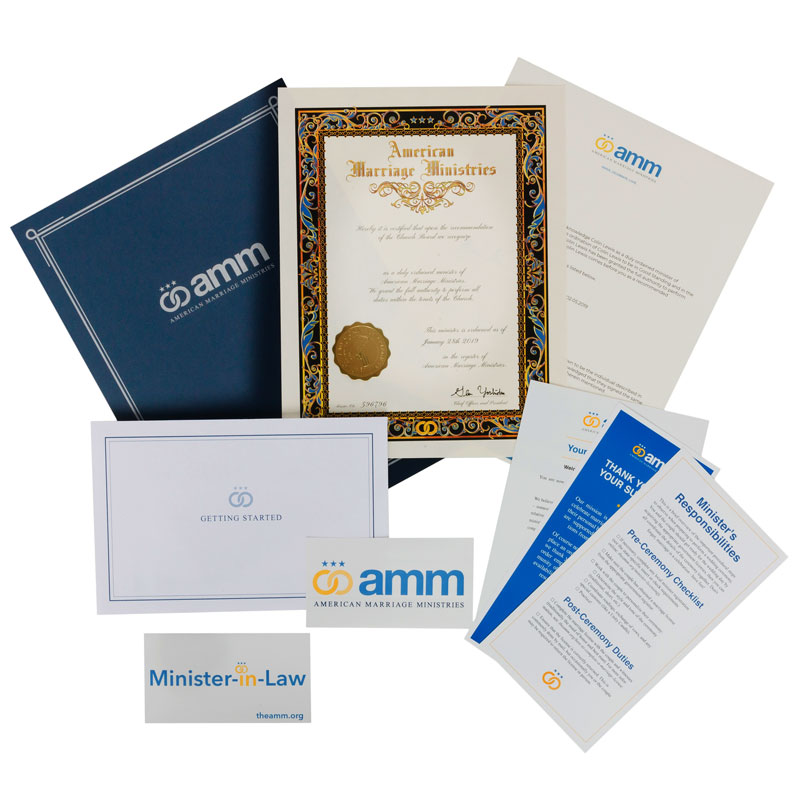Asking a Friend to Be Your Wedding Officiant

So you are planning on getting married and are figuring out the many details that go into planning your wedding. One important component, if not the most important (beyond who you choose to marry) is who you will choose to have the distinguished honor of solemnizing your marriage. The wedding officiant plays a crucial, essential, and irreplaceable role in the wedding day events. The officiant after all, shepherds the ceremony from beginning to end. They are the master of ceremonies.
The officiant is the only part of your wedding day plans that you actually need. If push came to shove, you could get married without a caterer, without a DJ, or photographer, or wedding planner, or that person that designs the floral arrangements. But to get legally married you would absolutely need to have a wedding officiant. There is no wedding without a wedding officiant.
Why You Should Have A Friend Officiate Your Wedding
For years now, more and more people have chosen to have someone they already know and trust take on the awesome responsibility of officiating their wedding. And in the age of COVID there are more reasons now than ever. Just consider the following:
- It’s free. You will probably not have to pay this person. And if your chosen officiant has to register with a government office and you choose to cover the costs, it will still be hundreds of dollars cheaper than hiring an officiant.
- You probably already know someone in your friend group that would make the perfect officiant. Everyone has that friend that is naturally confident in public speaking and knows how to command an audience. It may be the fiancées dad, or your college buddy. Plus, they are guaranteed to know you better than someone you found on weddingwire.com.
- You will have someone better prepared to help you with the ceremony. This person you already know will have unique insight into you and your relationship. They will better be able to assist in fine-tuning your vows. You will feel more free to reach out to them for assistance more than someone whose availability is determined by how much money you pay them. This person already gets you and will have better intuition on how to tailor the ceremony specifically for you and your partner.
- You already know and love them. It would really add an extra layer of meaningfulness to include them in this sacred rite.
- In the age of COVID, you may be able to find someone already in your COVID bubble that you won’t have to worry about as much. Someone that you know is responsible and can trust based on years of knowing each other.
- This simplifies your wedding plans. It is one less contractor that you have to search for, interview, draw up a contract for, and pay. The simpler you keep your wedding plans, the less you have to worry about on your wedding day. This is your wedding after all, and you should be able to have some fun!

What To Consider Before Asking a Friend to Officiate Your Wedding
More and more couples are choosing to have someone they know officiate their wedding. And it is easy to see why. Having your childhood best friend officiate your wedding infuses the ceremony with something truly special. But before you ask that person (we know you already have someone in mind), here are a few things to consider first:
- What is going on in this person’s life? You may already know the perfect person, but this may not be the perfect time. Contact them and feel things out first. They may have some family drama they are dealing with, or just started a new job. Find out what’s going on in their life before you pop the question. The more head start on this, the better. Maybe the person is busy now but the wedding date isn’t until next year. That gives you both plenty of time to prepare.
- Consider also asking for their help in writing the ceremony vows and adding special surprises. For instance, the officiant can act as a great intermediary to help work on the vows with the couple. The couple should not show each other their vows until the ceremony. But they can both show their vows to the officiant. The officiant can help the couple with their respective vows while keeping each partner unaware of each other’s vows.
- If you are going for a more eclectic ceremony involving non-traditional costumes (such as cosplay weddings), your chosen officiant will probably already be enthusiastic about the idea. This will give you the freedom to really do something unique for your wedding ceremony. Most officiants for hire will probably balk at dressing up as Obi-Wan the Officiant, unless you threw a bunch of money at them. But your college buddy Ken would probably love the idea (and already have the costume).
- Consider having some fun with having a mini-event for the person you want to officiate your wedding. Let’s call this the “Will You Marry Us” ritual. Take them out to dinner, or invite them over to your home, or plan a surprise party. It really is a lot of fun to have an “officiant proposal”, where you and your partner formally ask the person to officiate your wedding. “Alex, you were the one that introduced me to Charlie so many years ago. And we would like to know. Will you marry us?” Then crack open the wine, or sparkling water.
Important Officiant Responsibilities
Now taking on the responsibility of officiating a wedding is a big deal. And this may give pause to the person you want to ask. It is a big deal, one that involves both public speaking and legal responsibilities. At the same time, just because it is a big deal does not mean it is a difficult thing to do. In fact, as you do more research you will find that the whole process is ridiculously simple. Here are some valuable insights to both the performative and legal aspects of officiating a wedding:
Performative Parts of Officiating a Wedding
This is where the officiant will invest the bulk of their time and energy. The legal stuff is basically signing a piece of paper, but the ceremony is where you actually have to get up in front of a bunch of people and speak. For those who have not officiated a wedding before, this may seem like a daunting task. So here are some insights that will put your mind at ease:
- Most wedding ceremonies are no more than 10 – 15 minutes long. You’re not doing an hour long stand-up comedy set.
- You are speaking in front of the friendliest possible audience you can have. Everyone in the wedding reception is already rooting for you. Weddings are about celebrating love and union. If you get pre-performance jitters, just remember that this is an event that where empathy, compassion, and support are at the core of the experience.
- You can use a cheat sheet. If you are nervous you might forget a line or flub a word, don’t be. You are welcome to use a prop that has the ceremony script written out. In fact we encourage it. Not only does it give your hands a job while on stage, it looks good, and you can refer to it whenever you need to.
- The couple chose you. This means that even if you doubt your own abilities, the couple already knows you can fulfill this task. It is normal to have doubts and insecurities. We are human after all. But the fact that the couple chose you means that they already have confidence in your abilities, even if you do not feel as confident.
Legal Parts of Officiating a Wedding
The legal aspects of officiating a wedding are usually the first thing that people think of. Many people who are not familiar with online ordinations are surprised to discover that it is so easy to gain the legal right to officiate weddings. Why this is so is an esoteric topic, but the summary has to do with the US Bill of Rights and the 1st Amendment of the US Constitution. Basically, all people in America are free to celebrate their religious beliefs without interference from the government. And this includes the ability to officiate weddings.
On a practical level, there are two things to be aware of regarding the law.
- Does the state where I will be officiating a wedding require officiants to register with a Government office?
- What exactly do I need to do to make sure I legally marry the couple?
Let’s look at both of these questions in turn.
Does the state where I will be officiating a wedding require officiants to register with a Government office?
This depends on the State where you will be performing marriage. The Federal government does not stick its nose into these matters at all, as that would be unconstitutional. The States however can have the right to impose some form of officiant registration process. This is not a religious litmus test, as that would violate the 1st amendment, but simply a bureaucratic formality so that the State can keep records of who exactly is officiating weddings.
Most States do not impose any officiant registration process, however some do. Below is a list of the States/Territories that do require officiants to register with a Government office prior to officiating any weddings. Follow the links to learn more about the specific officiant registration process in each locality.

What exactly do I need to do to make sure I legally marry the couple?
Marriage traditions have thousands of years of history that gives them an air of sacredness and mystique. Wedding ceremonies themselves often tend to be elaborate affairs with many moving parts. Combined, these aspects of the “Marriage Institution” obscure the fact that the legal underpinning of Marriage is actually quite simple. Enter the Marriage License.
The only thing the officiant needs to be concerned with regarding the legality of the marriage is the piece of paper called the Marriage License. The marriage license is the legal document of marriage. Quite simply, the marriage license is just a legal contract. This contract is no more mysterious or magical than any other government enforceable contract, be it a home title, or renter’s agreement.
Furthermore, the bulk of the responsibility regarding the marriage license falls on the couple, not the officiant. Here are the salient facts that all officiants should know about the marriage license:
- The couple is responsible for applying for their marriage license. There are myriad online resources for couples on how much a marriage license costs, where they file for a marriage license, and on. We won’t get into that here. Suffice it to say, this is not your responsibility as the wedding officiant.
- The couple is responsible for showing you their marriage license. The first time you will see the marriage license is on the wedding. The couple must present to you their marriage license. This can be before or after the ceremony, it really does not matter.
- In fact, the marriage license does not necessarily even need to be presented and completed on the wedding day itself. The marriage license does need to be completed and returned within a timeline specified by the State. Within that time frame however, the marriage license can be completed and returned at any time.
- This is an important for couples that are planning a destination wedding. Most couples that have destination weddings have their marriage license completed and returned before the wedding date. This is done out of necessity but also has the added benefit of taking care of the legal stuff well in advance. This means that both the couple and officiant have one less thing to worry about on the wedding day.
- The officiant is responsible for requesting and reviewing the marriage license. The officiant needs to ask for the marriage license and simply check that the couple’s information is correct (name, date of birth, etc) and that the marriage license is still valid.
- The officiant is responsible for completing their portion of the marriage license. This simply involves completing a few fields. Since marriage licenses vary State by State and even within States, the specific fields on the marriage license will be different depending on which office issued the marriage license. Regardless, it is only a few fields and if you are unsure of how to fill any specific fields, we provide clear instructions for all possible fields that may be on the marriage license the officiant will be completing.
- Make sure the completed marriage is returned to its issuance office. In most states, the couple is responsible for returning the marriage license. And most couples return their marriage license by mail. We include this here because the officiant should follow-up with the couple to make sure the marriage license has been returned.
- It is rare that the state, county, or city government requires that the marriage license be returned in-person. This is especially true in the COVID age.
- When the couple receives their marriage license it will include instructions on the proper return of the license. So if you need further clarification on how exactly the marriage license needs to be returned, worry not. All of those details will be spelled out in these instructions.
We hope this clarifies the online ordination process to officiate legal weddings. Whether you are the couple or the potential officiant, we encourage you to learn more by visiting American Marriage Ministries at theamm.org.





